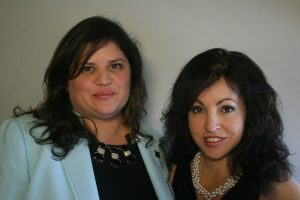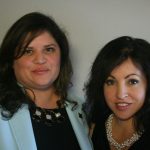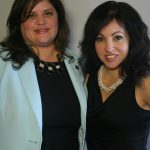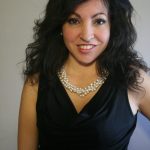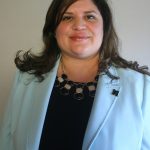Helen Torres and Carrie Lopez
Description
Helen Torres (44) and Carrie Lopez (46) talk about HOPE (Hispanas Organized for Political Equality) and the HOPE Leadership Institute.Subject Log / Time Code
Participants
- Helen Torres
- Carrie Lopez
Recording Locations
California African American MuseumVenue / Recording Kit
Partnership Type
OutreachInitiatives
Transcript
StoryCorps uses Google Cloud Speech-to-Text and Natural Language API to provide machine-generated transcripts. Transcripts have not been checked for accuracy and may contain errors. Learn more about our FAQs through our Help Center or do not hesitate to get in touch with us if you have any questions.
00:03 Hello, my name is Kari Lopez. I am 46 years old. She thought I was 46 last year it today is October 30th 2013. We are in Los Angeles, California and I am here with Helen Taurus in my relationship has grown from Community Advocate colleague to friend and I'm also part of her fan club mostly the president.
00:31 I'm Helen Taurus, my age is 44. I think we're here on October 30th. 2013 location is Los Angeles, California and my relationship to Carrie Lopez is we started as fellow board members on the board Advocates together for a lifetime now and to just one of my dearest all-time friends and gave Helen so on that note what had brought us together was this organization called hope has been as organized for political equality at the time of your life year were in a particular profession writing up in your career on your own coming from Michigan. What did the organization mean to you?
01:20 Hope was an organization that allowed me to find what I consider my home here in California as you mention. I am originally from Michigan. So when I came out to California only knew one other person and the reason I came out to California is being a let you know, I wanted to be part of a larger community of letting us and hope represent that to me. It wasn't just being part of a larger community of Latinos. It was being part of a community Latinas who were working really hard for the betterment of their community and so is my homecoming I felt at home right away with the women that were part of the organization and found some my dear seniors friends from it, but it's something that you had before. How did you know you needed it?
02:09 It was because I didn't have it. I've always been very fortunate that I've had wonderful women in my life my mother being one of them, but just from her experience of being very isolated and not being accepted for being a Latina in our community of being really able to express that not being able to share some of our Traditions. I couldn't wait to be in a in a place where people understood little things like why my mom didn't let me have sleepovers or why I wasn't allowed to go over to sleep over is or the ability to switch back and forth between English and Spanish the ability to Taka in a why we like different foods to more important things of our our journey here coming to the United States and and really finding acceptance.
03:00 For me, I grew up in California specifically Southern California. And so there was no difference was very diverse. You know, you had Samoans African Americans Latinos, right? We know how we refer to ourselves then it's Panic were are Mexican but we just you know in Surfers, you know, so you just wondering if mixture and went to University up in Northern California again not picking up on any differences within a California to the very nice blend was until I went to graduate school and I really felt different and I was on the East Coast at Harvard and not only that I feel like I was seen as a Latina and not really sure what that was, but it was very much seen as a California and and never be known and I think that's where it was became much more aware of my identity just as a, California.
04:00 Woman Latina. I came back and in and then grew also my identity around native being a Native American and so forth.
04:11 But that was a big eye-opener for me. And so knowing that that's how we were going to be seen in the country that I had to start building my relationships that way too but I couldn't take that for granted and then assumed that they were that they were developed. So coming to Los Angeles from San Diego looking for somewhere to be feel comfortable and at home I know but the precise moment. Hope had me it wasn't when I attended the Symposium. It wasn't when they asked me to help with the development of a leadership program for Latinas. It wasn't even when they asked me to join the board. It was when one of our board members call me mija.
05:12 For the record, what does mija mija means my daughter or no hurry, or it's a term of endearment to refer to somebody who's younger than you are in that context. It was a very familiar term of endearment. And so we grow up hearing that from our mothers or fathers. Our grandparents are aunts and uncles and so it just means that you know, it means home means you're somewhere where you're being looked after that you don't you know that your body very fondly.
05:59 It was just her way of seeing us not even knowing us for many years just knowing us very recently, but it was a way of showing that we were accepted there and looked after and that we were we weren't alone we were all together and as many of us did transplant into Los Angeles and it was it you're so used to being in charge and feel like being at least attempting to look like you're in control, but it's nice to know that you're somewhere where you can chest literally let your hair down.
06:38 When you were talking about being on the east coast and feeling like the other or realizing you were and other need to fill out that I think it's it's really built in into the culture of a m on the at that at least at that time on the East Coast where the the ethnicities in so far. They're very specific to either you or your fitting into a white or black frame of reference and even all the policy that we studied and challenges and situations that we were looking at as always I was very aware that they were seeing it through this lens of African-American and and Caucasian white and what was the discrepancy there and a dead challenges and disparities and so forth in the issues of brown or Latino Or Hispanic were rarely brought up because it just seems so distant.
07:38 And I usually associated with West Coast California or maybe as far as you know as closest, Texas, but it just did not permeate into the discussions around education disparities or needs or challenges, which is something that was very near and dear to me. Even when we were talking about faculty diversity. It was still not that the demographic changes that were looming in the next 10 to 15 years ahead not penetrated any dialogue or anybody's reality that we know that we face today very clearly.
08:20 The one that relates to when we were looking at leadership development for Latinas in the founders of Hope in the the board members at the time or scanning the environment and after being so successful with other programming to help Empower and and highlight a different issues and so forth. They realize that we were going to move the needle on the representation of Latinas at decision-making tables and where decisions impacting the Publican money and and politics of where all these conversations in decisions were happening. We needed to have more Latinas in those chairs and pointing it out was not enough. We realize we were going to have to get serious about the cultivation and development of Latinas specifically for roles where they either had to run for office or seek and appointed.
09:20 Social position and they're in scanning all the opportunities it can you know, there wasn't anything tailored for Latinas are Hispanic women. It was there was great programs out there for men and women business-oriented or not and so forth, but we needed to make a case for why there had to be a program for Latinas design by like latinas and for the benefit of Latinas what you were part of those conversations telling what was it? Like there was what was interesting to me going through some of the me to participate in some of the focus groups cuz at that time I wasn't on the board. I was remember I had it I was serving on various committees that they can be making sure that we are bringing these 400 women are Latinas from across the state to Sacramento. And so I was participating is a very active volunteer and then of course I participate in the focus group.
10:21 And I think what really struck me when there we were a group of Latino professionals talking about the need of a program like the Hope Leadership Institute was the common stories of isolation that we all had that you know, how often time we were the only one in the room that was either a woman or you know, obviously a woman and a Latina. So it was this kind of feeling that we could almost speak in shorthand with each other because we didn't understand the upbringing something most of us came from all of us very humble upbringings. The majority of us immigrants coming from you have really establishing if keeping it on to the our love with the language of Spanish, but really English dominant, but once again, it was this opportunity to be with a group and ask Polly the silliest questions that you've always wanted to ask that.
11:21 You're free to another settings and really getting some honest feedback. And I and I think that's one of those magical moments for me is being part of those focus groups and just remembering how we all just felt at ease with each other. And and when we when the Hope Leadership Institute actually started I remember being part of that first class and being somewhat intimidated because it is a multi-generational program. So there was women there that were my Idols for the you know, the community activist that I was hoping to hear that my career, you know what to do to track their careers in and see how I can kind of follow in their Footsteps in the to be in the room with them and then other young Latinas like myself at that time was an amazing opportunity to learn and to see how much I had to actually contribute to that some of the conversations that we were having around the politics of California at the time of understanding what the roll
12:21 Latina leadership would be for the State the importance of our responsibility to step up and two volunteers for these commissions to to move forward and and to run for office for some of us or for some of us like myself new take on the leadership of a nonprofit that will make a big impact in our community. So to be part of that first class to see that group of women come together and have that sense of responsibility and to have that moment of aha, we're part of something bigger. It was incredible bird that moment when you were walking into the room there was 42 of you must me.
13:03 And I was scared to death, then we can talk about that but it was a big undertaking but I don't I don't know what it was like to walk in as it as a participant as one of the 42.
13:19 I I know how when I walked in I felt honored a little bit intimidated but mostly very excited. I am I felt that that was one of those moments of my life that told me I'm on the right track II Men. I'm going to build from here and it's exactly where I needed to be. That's right. That's in that's consistently what we hear over the past 15 years. Is this the first time I've been in a room of all powerful Latinas, usually maybe there's one or two or three of us, but they have a room and of 20 to 40 and just being very to your point very humbled by it and very excited at the same time knowing that this is maybe the only time that we would have that in our lives. So I think the women really grow to appreciate that but why were you scared. Oh at walking into room.
14:19 The two of you, you know, fresh to La a year. I had a year under my belt in the LA Community took on this project and are our president at the time was taken by appointment, you know to work for the governor. And so I just felt like I was utilizing every talent and you know it at my disposal to pull together program that was challenging enough and was going to do the trick basically bringing these amazing women together and and half of the women I hadn't met yet and the other half that I knew of new by mohsen you by reputation and I was and I knew they were the right mixture but that was a lot of power in one room. A lot of Amina hundreds of years of experience combined and this was you know not
15:19 You know, these are not emerging leaders. These were women who came in with your own accomplishments and yet they United see the little hesitation that they universal remote not used to being around so many others like themselves and it mostly is hurting caps because everybody's alright everyone have their opinion of how the how the program should be run into. So that was there were moments when I knew that this was going to be different of all the leaves are programs that I have been part of delivering designing training. I knew that weekend this was going to be different. I'm never and women's leadership is always a very unique
16:04 Endeavor but this one in particular. I've never had a group talk about their commitment to each other the very first day of session. I remember that I remember towards the that first day of session towards the end of it and you revealed that a lot of the the the following sessions weren't going to be together. We would be split up into regions that we came from since it was a state why program? So the the individuals from the Bay Area would have a session in the Bay Area and Los Angeles. We have a session and Central Valley would have a session and right away. We were ready to March and demonstrate and say that is not the way it was originally was designed in 10 sessions three of which were going to be all together.
16:57 And so that was one that you just wanted time with each other and you didn't want to be subpoenaed to experience one part of the State versus another end in support but the the voice of commitment was about what you know, what are we going to do? What are we going to do for each other what we can do for the community on behalf of each other and two together in that in that combined commitment that I had never seen before and it normally folks who come into leadership programs there really wouldn't know. What is it that I need to be a better leader at adess. It's always II and that you know that there that first class and it's been consistent ever since it's we you know, what our responsibility not just to ourselves but to the Greater Community into the state and nation and your chest if I don't know if it was just to come font, you know, which is in the air. I'm not sure what we're that magic comes from.
17:57 I knew at that moment.
17:59 That this was going to take a greater commitment from me than any other leadership Endeavor that I had come across and I owed it to that greater cause to go with go with the desire of redesigned the program that weekend. So is that we were able to announce what that would look like and what you know, what would people we me and my multiple personalities but it was it was it was the right challenge. So right Challenge and I think we we hit on something and you know, we're lucky to have
18:38 Keep that same spirit and level of commitment these last fifteen years. How old were you and what were you doing at the time this I was I believe that 8:30. I always have this problem remember what my messages and I was working at United Way as one of their community relations officer, so
19:05 I still can't believe that it's been 15 years. I mean a lot has happened and we've seen some great success not only in the program but in our personal lives in a lot from it, and we've been able to contribute so much and I just I look at you and I think oh my gosh, you have fallen tiered for 15 years to this caused because it is a cost that is causes a movement of ensuring that Latinas are moving forward in their leadership development so that they can serve
